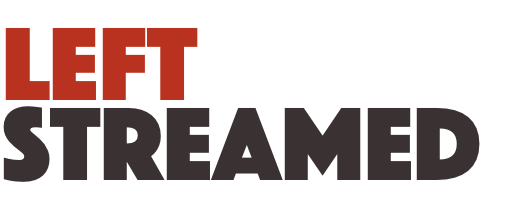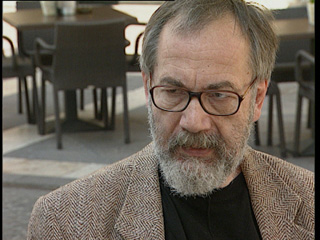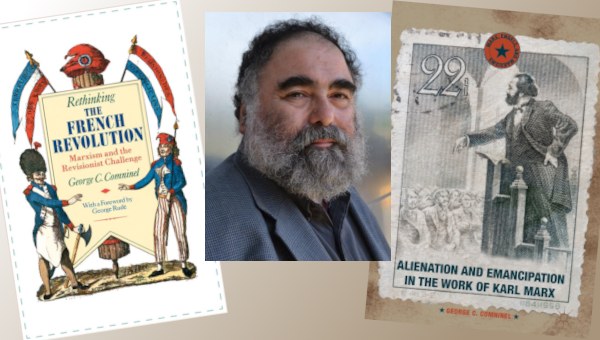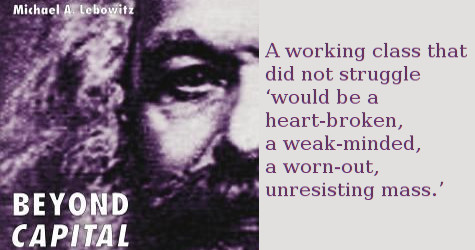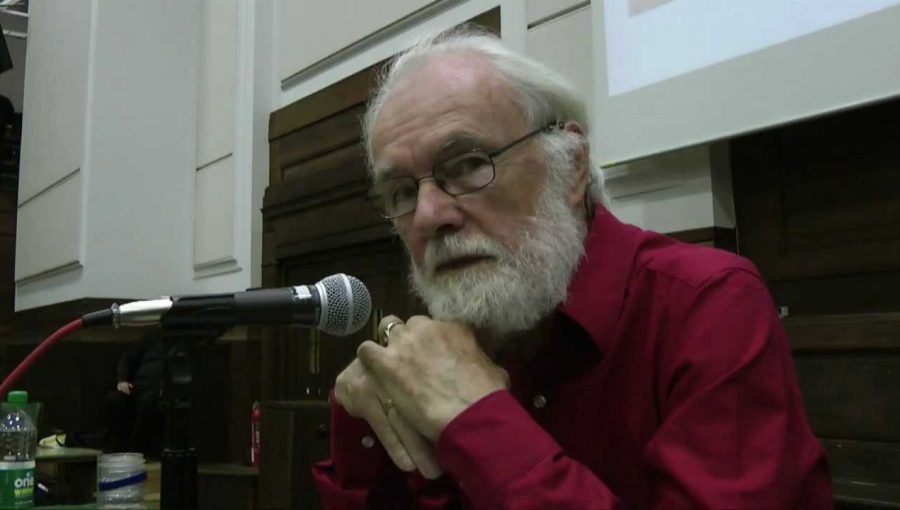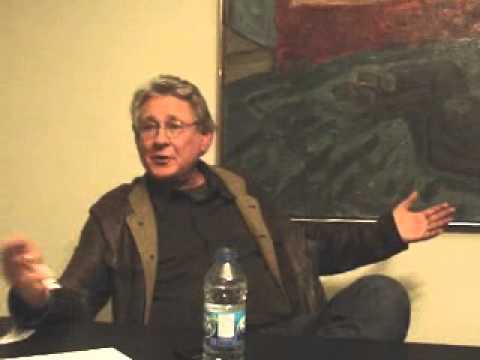The Failure of Liberal Democracy
Gáspár Miklós Tamás interviewed by Matthew Brett while on a speaking tour of North America, September 2011. Watch video »
Montreal — 22 September 2011.
Gáspár Miklós Tamás interviewed by Matthew Brett
Freedom, equality and participation in the democratic process are cornerstones of liberal democracy. Yet these principles are unravelling across the world as states become increasingly authoritarian and unequal. On a speaking tour of North America, Hungarian dissident intellectual Gáspár Miklós Tamás speaks with political science graduate student Matthew Brett about the failure of liberal democracy. Tamás is a significant voice of the Hungarian democratic opposition. He co-founded in 1988 the Network of Free Initiatives, a dissident movement under the communist regime of Janos Kadar, and subsequently served as Member of Parliament between 1989 and 1994 under the banner of the Free Democratic Alliance.
He is currently Research Professor at the Institute of Philosophy of the Hungarian Academy of Sciences and lectures regularly in political philosophy and social theory in universities around the world. Professor Tamás is the author of ten books in Hungarian and several of his essays have appeared in English translation in publications such as The Times Literary Supplement, The Spectator, Boston Review, Public Affairs Quarterly and Socialist Register. Professor Tamás spoke with Matthew at Concordia University in Montreal on Sept. 22, 2011 following his lecture, “The Failure of Liberal Democracy in Eastern Europe…and Everywhere Else.”
How would you define yourself politically?
Well I think I’m a man on the left and I would call myself a Marxist.
Your lecture is titled, “The Failure of Liberal Democracy in Eastern Europe…and Everywhere Else.” For this interview, I’d really like to focus on the nature and content of that lecture, perhaps just beginning with your understanding of what liberal democracy is and what that means.
Well of course I’m trying to keep close to the generally accepted definition in order to be able to talk reasonably. Liberal democracy is a combination of elements, mostly of liberal elements of individual rights and legal guarantees for autonomous self-activity, personal sovereignty, and guarantees against state power. And democracy which means, well, not simply peoples’ rule, but most certainly peoples’ participation in decision making – one man one vote, or one person one vote nowadays. And of course political participation is still far from being complete. We cannot say that every citizen is a lawmaker and a lawgiver. We are mostly passive recipients of law, and obedient or disobedient subjects to the legal system.
Professor Tamas argues that liberal democracy was unravelling as early as the 1980s but that things have become very evident after the recession, and it’s become particularly severe today. One of the central arguments he makes is that an increasing percentage of the global population falls completely outside of our dominant social order. Technology has made labour redundant for many in the world, and so they exist outside of the typical capital-labour relationship.
It seems to me that nowadays we are not only failing to fulfill the moral and theoretical conditions of what would constitute a liberal democracy, but even our faith in the fundamental principles is dwindling as a result of some changes. These changes consist mostly of technological and economic developments that partly through globalization (i.e. the flight of capital to lower wage regions of the world; therefore, the demolition of traditional North American and European manufacturing industries and other economic assets have been stripped and just exported to where there is technology on the one hand, and on the other hand, cheap labour). But most importantly, these technological developments make it so that every human activity is so mechanized – to use the old expression – digitalized, and miniaturized, and robotized, and automated and so on, that the old dispensation according to which most people worked in manufacturing or in services and commerce, it’s not true of today. There won’t be again full employment. Most people will be outside of productive work – productive meaning producing commodities that can be sold on the market. And that means that the previous modals of social organization, which were mostly work, will be lacking. They will be characteristic of only a minority of the populations, and the rest of us will be dependent upon the community itself to survive.
So partly there will be people who work in the public interest, but not productive, like schoolteachers and doctors and so on. And the rest, if society remains as it is, will be in dire need of social assistance, social assistance that must be available based on resources that governments insist they are lacking. Of course this is a system that I do not recognize or let alone like, but if you accept the basic facts about it – which I don’t – then it’s quite obvious that the resources are not there, and governments will have to choose between various groups – whom to assist, whom to help, and who will be left behind, neglected, excluded, condemned to very precarious life or to death by starvation. And therefore the political community is split along the lines of legitimacy of income – what I mean by this is that, still in all our societies there are two main legitimate sources of income: capital and labour. As for the rest, that comes to us through state redistribution – tax monies that are redistributed by government – that are subject to political decisions. And an increasing number of people are dependent on resources that are available to them through redistribution and government channels. And the government has the immense power nowadays, although it has been depleted institutionally, to decide who will get what, and since not everybody can receive these goodies, there’s a great fight about legitimizing or delegitimizing social groups.
So nowadays you will say that people with some illnesses, people above a certain age, immigrants, racial groups, lifestyle groups designated as being of a criminal behaviour and the undeserving poor – to use the 19th century expression – those people are not only ill-served by their government, but also excluded from the core of society, and real active citizenship is re-becoming a privileged instead of a general condition of human beings. And that is something new. After all, liberal democracies aspired to universalize civic rights, to extend the privileges and securities and pride of citizenship to virtually all human beings. Well this trend has been reversed, and this is what I call the failure of liberal democracy.
One of the examples that you’ve given along those lines is the Hungarian Constitution. Can you describe briefly what happened there?
Well the whole Hungarian political development over the last-year-and-a-half has been very much worrying. The new government has installed a new regime. This is not just a change of government; it’s a very deep transformation of the whole country with hundreds of new laws changing the whole legal makeup of the country – changing back from a very flawed but still existent liberal democratic order into a very modern, very contemporary authoritarianism, which is very carefully thought out and very coherent. It consists of a number of measures that I can’t list in a short interview, which is curtailing people’s freedoms from press, freedom of assembly, right to strike and all that stuff, while slashing most institutions that enjoyed some kind of autonomy, from media outlets, to universities, to schools, to art institutions, to unions, to whatever.
But all this is based on a very intellectually interesting development in constitutional law that also has some symbolic changes – for example, Hungary is no longer designated a republic as of the January 1. It’s just Hungary. And where there are articles from the old constitution disappearing, such as equal pay for equal work – that’s not any longer in the constitution. Old welfare statist prescriptions are not there any longer. But what is most important is that rights are not defined as they are normally – like in the Canadian Charter of Rights and Freedoms in the beginning of your Constitution – but they are made dependent on the satisfactory delivery of duties – delivery of public functions and observance of duties. And there are other articles of the Constitution wherein its partially hidden, partially declared openly, that only citizens with a community spirit, and honest work, and appropriate makeup of a citizen can really count on the plenitude of all rights. The state is not obliging itself any longer to the performance of obligations on the side of the state toward citizens. So, for example, whenever the old constitution said that the government must guarantee housing or health or whatever, it said now that the government must do its best to insure fairness, health, housing, welfare, et cetera. So both the welfare state remnants in the old constitution are wiped out completely, and also the absoluteness of rights on which liberal democracies are based in most places have disappeared, which of course enables the authorities to deny various things to citizens in need.
That seems to be a trend that we’re witnessing, as you say, not only in Eastern Europe, but everywhere else – these increasing trends of authoritarianism, particularly on the legislative side, very particular invasive laws. It raises, to me, interesting questions about the role of the state. Particularly in Canada, there’s a strong base of anarchist organizing. That is a strong impulse here on the left. I was wondering if you could speak to your thoughts on anarchism, particularly as somebody who has often worked with political parties.
Well, I was myself an anarchist as a young man, and most of that I haven’t reneged on. I published in some illegal publication called the Eye and the Hand, and it actually has been translated into French, and appeared in a small anarchist publishing house in Switzerland in 1985. “Louis la main” it’s called. It’s a short tract of anarchist political libertarian philosophy. The problem of the state is very perverse nowadays, because the state is the only hope of many needy abandoned people – the same oppressive people that causes most of the problems. And people cling to the state, still hoping that the state, according to the old principles, is still representing fairness, and help, and redistribution, and a soothing hand. Well needless to say that this is a vain hope.
But we always have to take into account that we are speaking within the frameworks of the existing capitalist system, which I’ve done up until now in this interview, accepting experimentally that this is the framework in which we live. And of course I’m not at all opposed to reformistically trying to improve our lot if possible, although in the past time we haven’t witnessed the most progressive performance. And when I’m taking a step back to look more carefully at things, of course I know that there is no substantial hope of the state improving.
You can see that in such countries like Canada, which, compared to others, has been a pretty mild proposition. It’s becoming ever more brutal, although nothing on the scale of the French or the Italian state. Nevertheless, I can see, even though I have no large knowledge of Canada, that privacy, treatment of prison populations, police powers, there’s a progress backwards. It’s called regress.
So of course I don’t think that, if indeed the possibility of oppression is enshrined in the basic tenets of any given society, then you can expect the oppressors to convince them that in the goodness of their heart that they should dispense with all this. Of course they wouldn’t. What has been the only thing, and what will always be, is to mount pressure and to build up counter-powers.
And if you’re talking to anarchists, the question is how to build up counter-powers, when counter-powers by their very nature are also hierarchical? You use coercion, which may be much more dispersed and less toxic than other kinds of coercion. Nevertheless, if you have leadership, if you have organizational blueprints, then coercion of one kind or another will always materialize. These are almost eternal problems. Nevertheless, I think we should turn – as well as doing everything else – to considering again the old problem of how to pre-empt a future – peaceful, and equal, and non-oppressive and non-alienating society – within our own circles. How to live in exploitative, and oppressive, and repressive and in all senses fucked up society, sorry, in a way in which we can at least try to realize in our own lives the principles according to which we would like to live. This is extremely, extremely difficult, given that we have to earn our living, and fit in, and avoid jail, and all those kinds of things, while compromising, and ducking, and hiding ourselves, and lying about who we are. I know very well how tactical life rots your teeth. There’s no one solution to this. This means that you have to build up milieus in which there’s some kind of confidence in which you can get moral help on all these difficulties, and this has all the usual problems of sect building, and cult building. There are many pathologies that beset freedom loving people who want to get outside these really intolerable societies.
Speaking very much to that – the attempt within existing social orders to create alternatives – there’s definitely a strong impulse, particularly after the latest crisis of capitalism, or in the midst of the latest crisis of capitalism, a strong socialist impulse. And I’d like to speak about a piece that you wrote, “Communism on the Ruins of Socialism.” At a time when vast segments of the left are calling for a revived socialism, that article very much says that if anything, socialism has helped sustain capitalism. So can you speak to that, perhaps?
Right, so this was initially a speech that I gave last year [2010] in Berlin together with Alain Badiou, Slavoj Žižek and Antonio Negri. I’m proud of it, yes – great men. So the main thing about it is that socialism, which is my common name for the social democratic and the Bolshevik branches of the former international workers movement, that in their own separate ways, what they have realized, which in terms of civilization is enormous – state based egalitarianism – real egalitarianism. I mean transformation of life in which, to use the language of the epoch, the common man for the first time could enjoy a roof over his and his families head, indoor plumbing, hot water, some sanitation, guaranteed pensions, paid holidays, all that stuff, which of course is an enormous advance compared to what the situation had been in the 19th century, and of course for millennia.
So for the first time, working people had a modicum of counter-power in the workers movement, in whatever forms – democratic or dictatorial forms – and gave a kind of counter-hegemony in working class culture. And what I’m always saying to make it comprehensible, is that all subordinate classes in history before, what was their culture? It was folklore, complaint, rage – but mostly complaint. And then the working class was the first subordinate class in history that had its own science, its own theory, its own philosophy, its own political organization, its own separate corporate pride, and its own attempt to gain power, and build up its own state, and to kick its adversaries in the teeth. And this is a tremendous historical development, a huge achievement…which failed.
Because of course it could not, and did not, create a society in which the fundamental characteristics of exploitation and hierarchy disappeared. These were, even in the social democratic variant, pretty hierarchical and oppressive societies, in spite of the undeniable great merits of the 20th century – I mean real heroism, so this is a respectable thing that will be remembered as Ancient Greece is remembered. Nevertheless, it is the past, and in many ways a very unsavoury past. I have no illusions about its tragic greatness, if you wish. Now, the characteristics of socialism in this sense – I mean real socialism in a social democratic and Bolshevik way – of course these were productivists and tried to accumulate and produce a lot and construct newer enterprises and plants and factories based on a very limited and naive faith in technology and the natural sciences, and in growth, which of course they shared with capitalism.
These were societies in which it was not the suppression of wage labour that was aimed at but wage raises; not the abolition of commodity production was aimed at, but more commodities (i.e. more consumption); wealth, abundance if possible. So therefore I feel that, as people have felt before, that there’s no time to try the detour through étatiste, welfarist, egalitarian systems to get humankind out of their contemporary shit. I don’t think that we can, or we should, try the social democratic solution, which is of course superior to the present order, but reconstructing it will be very onerous, people don’t really like it, and it could not address the bio-political problem that I alluded to earlier [the bio-political problem of climate change, which Tamas argues, is immensely difficult to tackle in a liberal democratic manner].
Now stimulating production wouldn’t solve the problems of the majority. Work has to be changed, production has to be changed, consumption has to be changed, social hierarchy has to be changed, the whole rationality of public administration and law has to be change – in short, the system must be changed, because it cannot survive in this way.
I very much would like humankind to survive. And I very much would like this to happen without supreme sacrifice – in destroying our livelihood, our culture, our nature, our towns and so on. A lot of valuable and fun things are going on, and it would be a pity if we had to hunker down in some igloos to survive the global storm provoked by capitalism. So it’s an urgent task, and I know it sounds absurd, but given what we see around us, it’s extremely urgent to turn toward the original ideas of communism, which of course, I must emphasize, has nothing to do with 20th century dictatorships.
The idea of a society in which the artificial separations between producers and the means of production, between classes, between races, between persons in authority and persons who obey et cetera, should be dispensed with, and in which indeed human activity based on personal aspirations and non-hierarchical relations should decide about directions to be taken, and which sacrifices in the favour of an imagined supreme common good are not any longer expected.
I’ll give you a shamefully simple example. What are we spending on the military, which is of course especially in North America is something really obscene, and which contributes to death by being shot, and death by the terrible environmental damage that military activities [inflict]. I just read a very good article in Canadian Dimension about the environmental damage that the military is inflicting on all our societies. And we are supposed to pay for this in taxes, and to suffer the terrible consequences in the name of a supposed superior common good un-debated by the citizens. These things have to stop. People should really take over, and triumph over the automatisms, and the mechanisms and the impersonal building blocks of capital in which what looks as spontaneity is just anonymity and impersonality of capitalist power. And it is urgent I say because we are of course in great trouble.
This has happened before, and in that respect we are very much like people in the 1920s – there’s a great bitterness, and unhappiness, and callousness everywhere – and this is nothing that cannot be stopped. We are no worse than we’ve been before, nor better, but there’s no really intrinsic reasons why things should be like this. And I think the radical solutions will do, because the moderate solutions have been tried, are being tried, without any result.
I mean quite seriously who would really believe that, for example in your country, Mr. Harper’s Conservative government gets voted down in one moment and then comes who? You know, Mr. Topp [NDP leadership candidate] or somebody, more humane – a slower version. And everybody knows, of course even small advances aren’t to be spurned, but they won’t really help. But what is the obstacle between us and this noble goal is a great deficiency of which I share, unfortunately. We don’t have the innovative and imaginative way of people in the 19th century to invent new political forms. I think we all should furiously think about what kind of guaranteed free forms of political struggle to invent, because we seem to be clueless, myself included.
Matthew Brett is a political science graduate student at Concordia University and is on the organizing committee for the Montreal-based Forum to Resist the Conservatives. This interview was conducted for CKUT 90.3 FM, Montreal.

